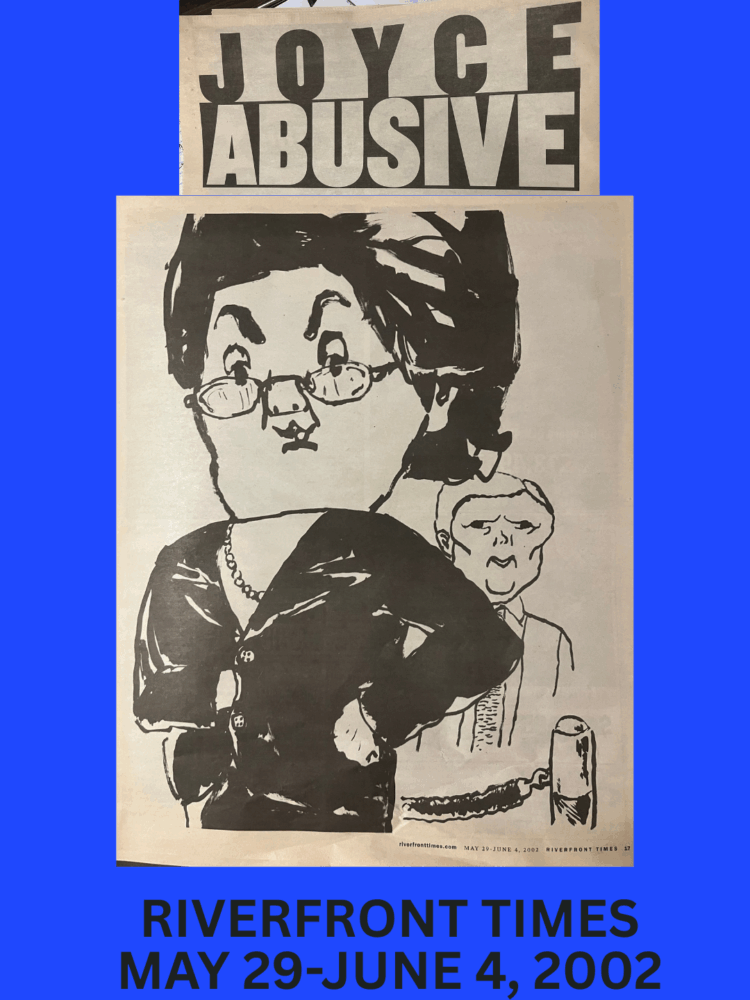Joyce Aboussie bio, part 2 of 7

John’s note: Joyce Aboussie is an iconic figure in both Democratic politics and the philanthropic world. In 2002, The Riverfront Times’ DJ Wilson authored an in-depth profile of Aboussie, published in the May 29-June 4 edition of the paper.
The Riverfront Times has since been sold, and Wilson passed away in 2019. To my knowledge, no versions of Wilson’s article remain online today. In the spirit of capturing Aboussie’s most valuable lessons – and to preserve Wilson’s detailed journalism – I’ve captured the original text of the RFT piece with occasional context added. For ease of readability, I’ve split the article up into seven parts, using the same topic breaks originally used by Wilson in the print piece.
— John Combest
Part 1: Joyce Aboussie
Article text of Part 2 begins below:
Several years before the Gaertner fiasco, in 1991, Gephardt had not yet calculated exactly where to come down on the North American Free Trade Agreement. Some of the South Side congressman’s union support was growing restless.
There was even loose talk – perish the thought – that organized labor might consider supporting a Democratic challenger to Gephardt, the former Fourteenth Ward alderman who had been elected to Congress eight times. Robert Kelley, St. Louis Labor Council president, hinted that it was possible.
But who would be foolish enough to mess with the all the money, all the seniority, all the political steam of the Gephardt juggernaut?
Anyone with any sense knew that talk of a primary opponent was merely the unions firing a warning shot within earshot of the bow. Wouldn’t happen.
It didn’t take long for Gephardt to snap to attention. Gephardt pushed for a ban on permanent replacements for strikers, he toured the maquiladora plants along the Mexican border and he urged protections for U.S. workers in trade deals. He announced a “Gephardt Amendment” to fix union concerns about the fast-track talks.
OK.
Message received.
But Jefferson County Commissioner Ron Casey must have been tuned to a different frequency. Contacted by media, he made vague comments about being receptive to the idea and said union people had talked to him about running for Congress.
As a Jefferson County commissioner, Casey had a political base, and he could play on the anti-Washington feeling among many of the Third District’s new constituents. Gephardt’s district had drifted south, following the exodus of voters from South City to South County to Jefferson County. A Jefferson County politician was a long shot, but he had a shot.
Casey was summoned to see Gephardt’s national political director.
Ron Casey, meet Joyce Aboussie.
Casey showed up and got his head handed to him.
“Joyce brought him into her office, sat him down; it was just him and Joyce,” recalls a veteran political observer. “She just ripped him a new a-hole. It was ‘If you ever say anything like this again … ‘ Basically she told him, ‘This is my territory, and if you ever say a f—ing word about running for Congress again, I will destroy you.’ He left that meeting saying, ‘I’ve never seen anyone behave like that.””
For Casey and others who have felt the wrath of Gephardt’s bodyguard Joyce Aboussie, the way the mes-
sage was delivered was as important as the message itself.
It wasn’t, “Hey, look, I saw this article in the paper. Are you considering running for Congress?
It was flat-out intimidation.
The threat Aboussie used that day wasn’t literal destruction bet political destruction. Politicians survive on reputation and money. As Aboussie rides shotgun on Gephardt’s gravy train, she can shorten a politician’s career by bad-mouthing the candidate, and she can make fundraising very easy or very difficult.
“Here’s the thing about her.” says one operative. “She really has got her fingers deep into the pie and will cut you off, and you will never know it was her, She’ll hurt you. If you’re up against her, she will just flat hurt you in whatever way she can. And it will never be known that it was her.”
Sometimes stealth isn’t needed.
“Joyce is not at all abashed when something is going to happen that she doesn’t want to happen,” says another, “She will say in no uncertain terms, to whoever that person or organization or group is: “Cross me, pay a price. And she will let you know what that price is, which is usually your complete and utter destruction.”
Casey may not have ever seriously considered a race against Gephardt, but after his in-your-face meeting with Aboussie, he lost any such notion in a hurry.
In 26 years on Capitol Hill, Gephardt has never had a significant Democratic challenger. Republicans thought they had a chance in 2000, when their candidate, Bill Federer, raised more than $1 million.
Federer got 40 percent of the vote. Gephardt got 58 percent.
Part 3 of 7: Joyce Aboussie and Dick Gephardt, Bob Holden, Francis Slay, Jeff Rainford, Richard Callow
John Combest – Missouri political news headlines